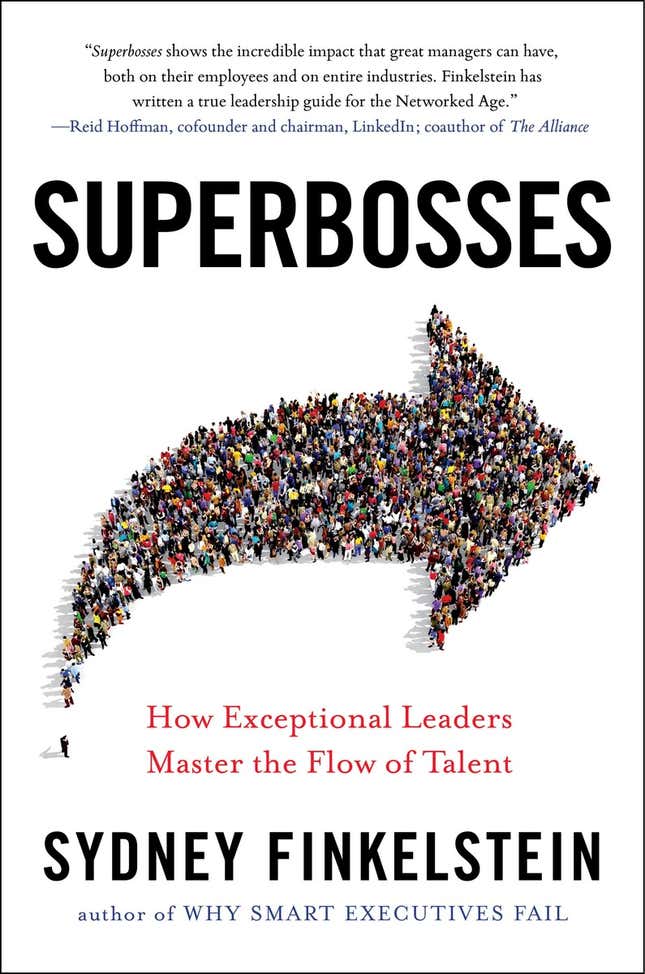For every Mark Zuckerberg or Bill Gates, there’s a Ken Lay or Martin Winterkorn—disgraced CEOS best known for immersing their companies in scandal. What qualities are distinctive to these failed leaders?
I thought about this question as I interviewed senior executives from companies that had fallen from the top for my book Why Smart Executives Fail. I identified several key attributes of failed leaders. They believe they know more than everybody else. They think that the usual rules of business don’t apply to them. They disregard major obstacles rather than changing course. And they rely on the same playbook that got them into the winner’s circle even when the game has changed on them.
But years later, researching my new book Superbosses, I discovered that many celebrated CEOs—leaders who have helped spawn new generations of talent in their industries—exhibit the same characteristics as fallen executives.
Take superboss Larry Ellison, whose computer technology company Oracle has given rise to more accomplished executives over a period of decades than almost any other company in Silicon Valley. Ellison’s management style embodied some of the same attributes of the failing CEOs. For example, he once said, “I invented my own style of management called MBR. MBR stands for ‘management by ridicule.’”
What gives? The answer, I believe, lies in what I call the Big Personality Paradox.
Both the fallen executives and the reigning champions have enormous, larger-than-life personalities. They’re opinionated, zealous about their beliefs, aggressive, and competitive. They’re often Type A people who like to win. They’re the last people we would expect to step aside so that younger talent can claim the spotlight.

Yet that’s exactly what the most successful CEOs manage to do. Even when they’re hard-driving types who care about winning above all else, they manage to temper their natural inclination to dominate everyone around them.
Superboss and jazz great Miles Davis offers a useful example. He believed that each band member deserved his “moment in the sun,” even though Davis was well aware he was most concerts’ headline attraction.
Think about that. The fans had turned out to see Miles Davis, a brilliant man who had few doubts about his abilities and power to mesmerize audiences. Yet he would regularly step aside for band members to shine, both on stage and when producing albums. His superstar protégés, from Herbie Hancock to Wayne Shorter to Bill Evans, are a testament to the power of this approach.
The late restaurant industry innovator Norman Brinker, who propelled concepts including casual dining and salad bars, operated on a similar principle. “Norman has accomplished [a lot] … but he never has to be the smartest guy in the room,” former Burger King CEO Jeff Campbell told me in 2006.
Some superbosses make a practice of moving on quickly to the next project or business issue once they’ve helped team members get a grip on who’s in charge and what they’re supposed to do. Multiple protégés shared stories of how their superbosses purposely left room for others to take on leadership roles, sometimes even in high-stress situations. Legendary San Francisco 49er head coach Bill Walsh for example, expected his assistant coaches to come up with insights, or specific play calls, throughout the game.
In the end, the difference between superbosses and their failed peers boils down to something quite simple. Superbosses have the kind of confidence that allows them to understand that they don’t need to constantly dominate others. This frees them up to enjoy other big personalities and even to take responsibility for helping younger colleagues rise up and become big personalities themselves. Longtime coach and athletic director Ted Leland recalled that his superboss, Bill Walsh, used to say, “‘Part of your job as manager is to make sure that the people under you are successful.’”
Larry Ellison was no different. He once commented that Oracle had a great succession plan, as it has always been full of employees who have gone on to become CEOs. Oracle alums have gone on to become CEOs at companies like PeopleSoft, Siebel Systems, and Salesforce.
Distinguished leaders remember to make room for others, no matter how successful they are. That opens the door to tremendous opportunities for their subordinates and colleagues. It also turns out to be the crucial differentiator between success and failure for leading entrepreneurs, creative iconoclasts, and business leaders alike. Superbosses are strong-willed and confident. But they also know that the true path to lasting success is by cultivating other great talents.
In the end, the key to great leadership isn’t ego. It’s empathy.
